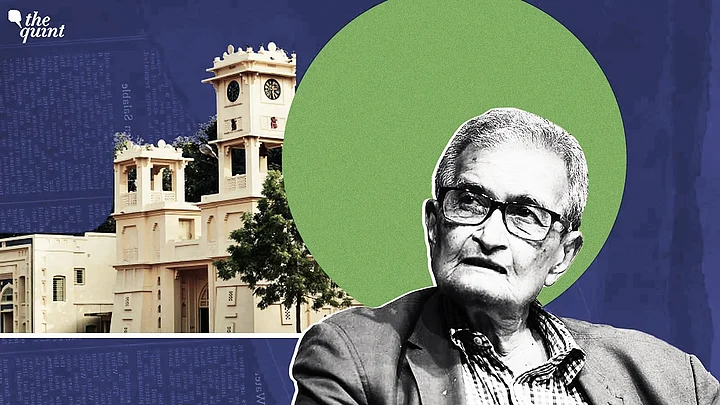An unseemly drama is playing out in Santiniketan, the abode of Visva-Bharati, the university set up by Rabindranath Tagore in 1921 with the object of offering students the opportunity to learn from some of the finest minds in the world. The university authorities, led by its current Vice-Chancellor, Bidyut Chakrabarty, have been engaged in a relentless effort to evict economist and Nobel laureate Amartya Sen from his family home, 'Pratichi' — supposedly because he has been illegally occupying a piece of campus land.
On Thursday, the Calcutta High Court granted an interim stay on Visva-Bharati’s move to evict Sen on 6 May and directed the Birbhum district court to hear the stay application on 10 May.
While civil society members are outraged by the university labelling the 89-year-old Sen as an “encroacher” and “land-grabber” to oust him from his ancestral home, Chakrabarty and his cohorts seem hellbent on seeing their pet project through.
What Prompted the Eviction Order?
In October 1943, a 99-year lease agreement for 1.25 acre of land was signed between Amartya Sen’s father, Professor Ashutosh Sen, and Rabindranath Tagore. The lease was registered in November 1943. Visva-Bharati, which became a central university in 1951, now claims that the actual quantum of land in Sen’s possession is 1.38 acre and hence, Sen is unlawfully occupying 13 decimals of land which is owned by it.
Chakrabarty insists that Sen needs to return the 13 decimals of land to the university or else face eviction. Simultaneously, a well-orchestrated campaign has been launched to vilify Sen, who is internationally honoured as an economist, scholar, and humanist, as some sort of a criminal and a squatter.
Ahead of its intended eviction day on 6 May (now stayed by the Calcutta High Court), Visva-Bharati is said to have even procured bulldozers to carry out the noble exercise of demolishing the house of a Nobel Prize winner, who is arguably Santiniketan’s most distinguished son.
It is worth noting that Sen merely inherited the property from his father. He did not purchase, lease, and much less, "grab" any part of it himself. Moreover, in 1943, land measuring techniques were rudimentary, with the result that it often turned out that the actual land allotted was slightly more or less than the area mentioned in the records. That this minuscule discrepancy in the case of Sen’s home in Santiniketan is being used as an excuse to go after him with all guns blazing speaks volumes about the motivation of the university authorities.
Targeted Attack Against Amartya Sen
Chakrabarty has frequently faced allegations that he is a stooge of the BJP government at the Centre and has dedicated himself to the saffronisation of Tagore’s university. In fact, Bengal Chief Minister Mamata Banerjee has openly called him an agent of the RSS. Needless to say, she has also strongly opposed the university’s campaign against Sen.
Since Visva-Bharati is a central university, the vice-chancellor is of course, an appointee of the central government. But Chakrabarty has made sure that the sin of neutrality cannot be laid at his door. By word and deed, he has brazenly displayed to which star his wagon is hitched.
Earlier this year, in a public spat with the chief minister, Chakrabarty said that the university did not need her blessings, as it was guided by the path shown by the Prime Minister, who is also the chancellor of Visva-Bharati. Hence, it is not hard to comprehend why Chakrabarty, whose job is to run Visva-Bharati and make it the centre of academic excellence that it once was, has instead made it his mission to harass Amartya Sen and hound him out of his ancestral home.
Sen is not beloved of India’s ruling dispensation. He has been a vocal critic of Narendra Modi and his government’s economic policies. He spoke out against demonetisation, that magic bullet which was supposed to have wiped out black money, but only ended up wiping out large swathes of India’s small and medium enterprises and set the economy back by several years. And he has made no bones about his strong aversion to the government’s Hindutva agenda and its politics of polarisation.
In such a scenario, Visva-Bharati’s ugly persecution of Sen smacks of a clear political agenda. Does the VC have no better use for his time than to engage in this bizarre fight for the retrieval of 13 decimals of land? Does he have no bigger concern than to plot the eviction of a man who is honoured and venerated at home and in the world?
The real purpose of this exercise to badmouth Sen and besmirch his reputation is clear enough. Its real purpose is to earn brownie points from the powers that be. After all, the worshipper’s job is to please the idol in any which way possible — and what better way to ingratiate oneself with the regime than to denigrate a renowned scholar despised by it?
Chakrabarty, who was appointed VC in 2018, is nearing the end of his term. His tenure has been marked by widespread protests against his modus operandi and demands for his resignation from students’ and teachers’ bodies. The decline of the once glorious Visva-Bharati has carried on apace. But, who knows, Chakrabarty may yet be rewarded for his work.
Irrespective of which way the legal battle between Visva-Bharati and Amartya Sen pans out, one thing is beyond doubt: The ferocious tussle between rival political forces and the consequent culture wars are fast dragging Bengal down the path to lumpenism and chaos. When you want to bring down your finest, you are on the path to civilisational rout.
(Shuma Raha is a journalist and author. She tweets @ShumaRaha. This is an opinion piece and the views expressed are the author’s own. The Quint neither endorses nor is responsible for them.)
(At The Quint, we question everything. Play an active role in shaping our journalism by becoming a member today.)
